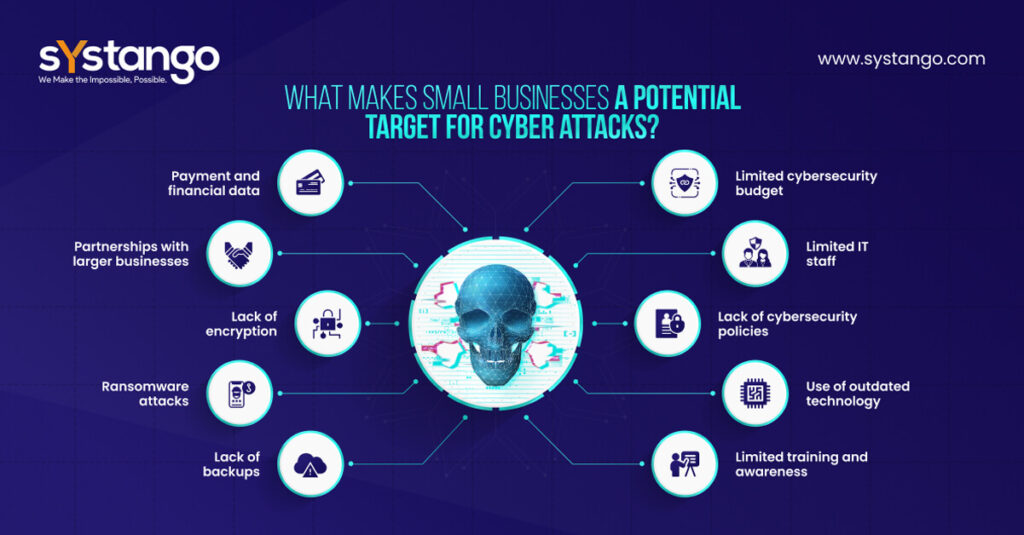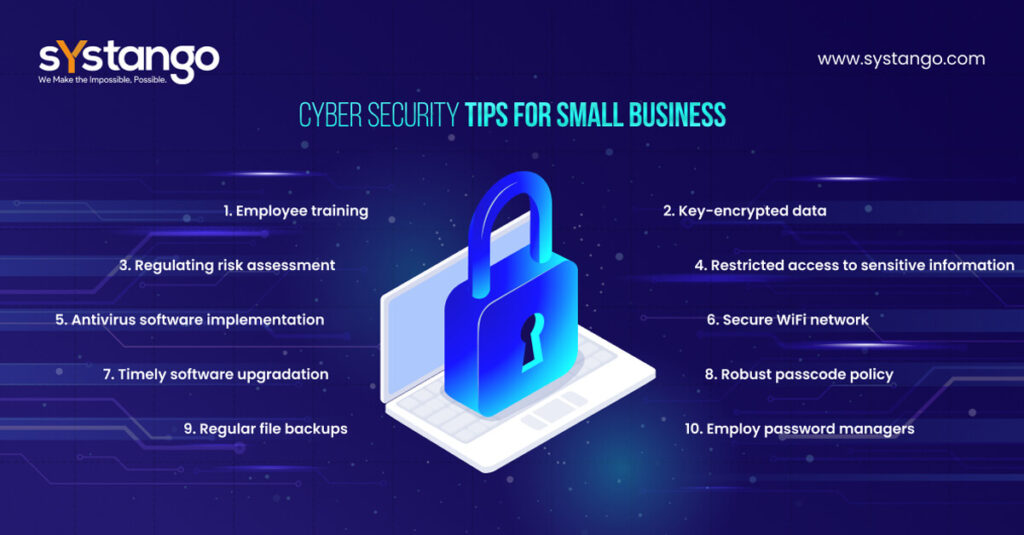The Importance Of Cybersecurity For Small Businesses
Published on 15 Mar 2023

The Importance Of Cybersecurity For Small Businesses
Small businesses are increasingly facing cyber attacks, and the impact of these attacks can be disastrous for their operations. Considering these cyber threats, the importance of cybersecurity for small businesses has become crucial.
One real-life example of a small business facing a cyber attack is the case of Cottage Health, a California-based healthcare provider. In December 2013, Cottage Health experienced a data breach that compromised the personal information of approximately 50,000 patients, including names, addresses, dates of birth, and social security numbers. The breach happened due to a third-party vendor’s failure to secure a server containing patient data.
As a result of the breach, Cottage Health faced a class-action lawsuit that resulted in a settlement of $4.125 million. In addition to the financial impact, the data breach also had significant implications for Cottage Health’s reputation, as patients’ trust in the healthcare provider was compromised.
This case highlights the devastating impact that cyber attacks can have on small businesses, even those in the healthcare sector, which are typically considered high-security industries.
Let’s now understand the importance of cybersecurity for small businesses. This article will cover the following aspects of cybersecurity:
- What Is Cybersecurity?
- What Makes Small Businesses A Potential Target For Cyber Attacks?
- Why Is Cybersecurity Important For Small Businesses?
- 10 Cyber Security Tips for Small Business
What Is Cybersecurity?
Cybersecurity is the practice that safeguards digital devices, networks, and sensitive information from unauthorised access, theft, damage, or other malicious attacks. It encompasses a range of techniques, including encryption, firewalls, intrusion detection and prevention systems, and security software that can help prevent, detect, and respond to security breaches.
Cybersecurity is a critical component of organisations that use digital technologies to store, process, and transmit data. For small businesses, cybersecurity is essential for protecting sensitive data such as customer information, trade secrets, and intellectual property.
Examples Of Cyber Attacks
In 2017, a global ransomware attack known as WannaCry infected over 200,000 computers in 150 countries, causing significant disruption to hospitals, governments, and businesses. The attack exploited a vulnerability in Microsoft Windows and demanded ransom payments in exchange for the release of encrypted data. The attack highlighted the importance of keeping systems up-to-date with security patches.
In 2020, a cyberattack on software provider SolarWinds compromised numerous government agencies and major corporations. The attackers gained access to SolarWinds’ software update system and used it to distribute malware to over 18,000 organisations. The attack demonstrated the potential for supply chain attacks and the importance of securing third-party software providers.
These real-life examples demonstrate cybersecurity’s role in protecting individuals, organisations, and governments from cyber threats. Effective cybersecurity measures, such as network security protocols, data encryption, and regular security audits, can help prevent and mitigate the impact of cyberattacks.
What Makes Small Businesses A Potential Target For Cyber Attacks?

Small businesses are increasingly becoming a target for cyber attacks. With the growing number of businesses operating online and using digital technology in everyday business operations, small businesses are more vulnerable to cyber threats. Here are some reasons why small businesses are a potential target for cyber attacks:
- Limited cybersecurity budget: Small businesses typically have a limited budget for cybersecurity. This often means small businesses lack the resources to invest in robust cybersecurity measures, leaving them vulnerable to cyber-attacks.
- Limited IT staff: Small businesses often have limited IT staff, and lack the expertise to manage complex cybersecurity systems. This can make it difficult for them to detect and respond to cyber attacks, leaving them vulnerable to data breaches and other cyber threats.
- Lack of cybersecurity policies: One crucial cyber threat concern is the lack of formal cybersecurity policies for small businesses. This means that employees are not aware of the risks associated with using company devices and networks, making it easier for cybercriminals to gain access to sensitive information.
- Use of outdated technology: Small businesses at times use outdated technology, which does not keep up with the latest cybersecurity threats. This can make it easier for cybercriminals to exploit vulnerabilities in the system.
- Limited training and awareness: Small businesses do not provide their employees with adequate training on cybersecurity best practices. This can lead to employees unwittingly exposing the company to cyber threats.
- Payment and financial data: Small businesses are more likely to store sensitive payment and financial data on their systems, making them a target for cyber-criminals who are looking to steal this information.
- Partnerships with larger businesses: Small businesses that partner with larger companies can become a target for cyber attacks. Cybercriminals target smaller businesses to gain access to more significant business systems and data.
- Lack of encryption: Small businesses majorly do not use encryption to protect their sensitive data. This can make it easier for cybercriminals to access and steal this information.
- Ransomware attacks: Small businesses are more vulnerable to ransomware attacks, as they do not have adequate resources to quickly recover from such an attack.
- Lack of backups: Small businesses do not have adequate backup systems in place. This means that if they are hit by a cyber attack, they can lose valuable data that they cannot recover.
Why Is Cybersecurity Important For Small Businesses?
To answer why do small businesses need cybersecurity, you must consider the significant rise in cyberattacks, digital data theft, phishing attacks, ransomware and a lot more. Cyberattacks can lead to theft and damage of the following:
- Access to client lists
- Client credit card credentials
- Business bank account details
- Entire business pricing plan
- Potential and launched product design blueprints
- Business improvement plans
- Details of the manufacturing process
- Various intellectual property details
Above mentioned factors answer why cybersecurity for small businesses is the need of the hour. A large number of small businesses leverage cloud-based data storage systems and tools to regulate their day-to-day operations like advertising, trading, meetings, communicating, and banking transactions. Based on a business’s reputation and financial safety, small businesses need to safeguard their data via cloud-based systems from sudden cyber attacks and unauthorised breaches.
10 Cyber Security Tips For Small Business

Now that you know the reasons why small businesses need cybersecurity, let’s look at the cybersecurity checklist that entails 10 tips to mitigate cyber-attacks efficiently:
- Employee training: Implement cyber security awareness training for small businesses and train your employees regarding the importance of using strong passcodes and locating phishing emails. Set specific corporate cybersecurity policies for small businesses which entail ways to manage and safeguard customer data and other important information.
- Regulating risk assessment: Assess the potential hazards that could jeopardise the integrity of your business’s networks, systems, and data. Use the findings to develop a strategy for addressing security vulnerabilities. In addition, as part of your risk evaluation process, identify the locations and methods used to store your data, as well as the individuals who can access it. This process will help you reassess and redefine your business security strategy.
- Antivirus software implementation: Select antivirus software that can safeguard all your business devices from spyware, viruses, phishing scams and ransomware. Also, make a note that the software you select cleans all your devices and sets them to the pre-infected state.
- Timely software upgradation: Keeping your business operations software up-to-date is crucial, in addition to antivirus software. Software vendors often release updates to improve their products or fix security loopholes, so it is essential to ensure that your software is regularly updated.
- Regular file backups: One way to protect your data from potential attacks is by using a backup program that can automatically create duplicate copies of your files and store them in a secure location. It’s recommended to choose a backup program that has scheduling or automation features to avoid the need for manual backups. Additionally, to ensure that your backups are not affected by ransomware attacks, it’s best to store them offline.
- Key-encrypted data: Encryption is a security measure that transforms data on a device into indecipherable codes, ensuring its safety. The technology is developed to account for worst-case scenarios, whereby if a hacker manages to obtain the data, it remains useless without the decryption keys. This precautionary approach is crucial in the face of the widespread exposure of billions of records annually, providing a reasonable level of security.
- Restricted access to sensitive information: To mitigate the potential data breach and lower malicious insiders obtaining authorised access to sensitive information, limit the number of individuals who have access to critical data. By doing so, you can ensure that only the selective ones have the power to view and manipulate this information.
- Secure WiFi network: Enhance the security of your Wi-Fi network against hacker attacks by modifying the name of your wireless access point or router, commonly known as the Service Set Identifier (SSID). Additionally, employ a robust Pre-shared Key (PSK) passphrase to further safeguard your network.
- Robust passcode policy: Increasing the complexity of a passcode decreases the likelihood of a brute-force attack being successful. Implementing a policy that mandates passcode changes at regular intervals, preferably every three months is also recommended. As an extra layer of protection, small businesses should enable multi-factor authentication (MFA) for employee devices and applications.
- Employ password managers: A password manager is a tool that stores login credentials for websites and applications, usernames, and passwords, and even automates security Q/As. With this tool, users need only to remember a single master password or PIN to access their vault of login information.
Key Takeaway: Cybersecurity For Small Businesses
Not paying attention to cybersecurity poses a significant danger to small businesses. With increasing interconnectivity among businesses, the risks of cyber threats can affect not only the organisation but also its customers, partners, and suppliers.
Cybersecurity for small businesses helps prevent malware, ransomware, and bot attacks. They should adopt comprehensive cybersecurity measures. These measures encompass antivirus programs, firewalls, and network security solutions that proactively safeguard all devices connected to their network.
Get in touch with us and leverage Systango’s cloud-based services, security solutions and small business cyber security consulting that can help mitigate cyber-attacks effectively!
Related posts
Artificial Intelligence
Generative AI
AI/ML
Cloud
How Gen AI and Cloud Security Can Help Business Leaders: Strategies, Steps and More
16 Jan 2025
Cloud
Cloud Services
Why Are Top Businesses Choosing Google Cloud Services?
12 Jun 2024
Let’s talk, no strings attached.